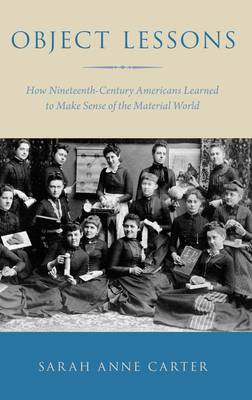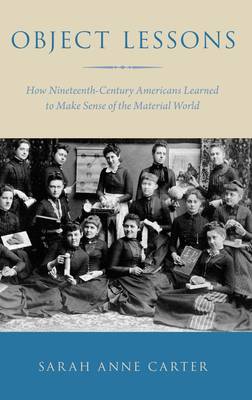
Door een staking bij bpost kan je online bestelling op dit moment iets langer onderweg zijn dan voorzien. Dringend iets nodig? Onze winkels ontvangen jou met open armen!
- Afhalen na 1 uur in een winkel met voorraad
- Gratis thuislevering in België vanaf € 30
- Ruim aanbod met 7 miljoen producten
Door een staking bij bpost kan je online bestelling op dit moment iets langer onderweg zijn dan voorzien. Dringend iets nodig? Onze winkels ontvangen jou met open armen!
- Afhalen na 1 uur in een winkel met voorraad
- Gratis thuislevering in België vanaf € 30
- Ruim aanbod met 7 miljoen producten
Zoeken
Object Lessons
How Nineteenth-Century Americans Learned to Make Sense of the Material World
Sarah Anne Carter
Hardcover | Engels
€ 56,95
+ 113 punten
Omschrijving
Object Lessons: How Nineteenth-Century Americans Learned to Make Sense of the Material World examines the ways material things--objects and pictures--were used to reason about issues of morality, race, citizenship, and capitalism, as well as reality and representation, in the nineteenth-century United States. For modern scholars, an "object lesson" is simply a timeworn metaphor used to describe any sort of reasoning from concrete to abstract. But in the 1860s, object lessons were classroom exercises popular across the country. Object lessons helped children to learn about the world through their senses--touching and seeing rather than memorizing and repeating--leading to new modes of classifying and comprehending material evidence drawn from the close study of objects, pictures, and even people. In this book, Sarah Carter argues that object lessons taught Americans how to find and comprehend the information in things--from a type-metal fragment to a whalebone sample. Featuring
over fifty images and a full-color insert, this book offers the object lesson as a new tool for contemporary scholars to interpret the meanings of nineteenth-century material, cultural, and intellectual life.
over fifty images and a full-color insert, this book offers the object lesson as a new tool for contemporary scholars to interpret the meanings of nineteenth-century material, cultural, and intellectual life.
Specificaties
Betrokkenen
- Auteur(s):
- Uitgeverij:
Inhoud
- Aantal bladzijden:
- 218
- Taal:
- Engels
Eigenschappen
- Productcode (EAN):
- 9780190225032
- Verschijningsdatum:
- 6/08/2018
- Uitvoering:
- Hardcover
- Formaat:
- Genaaid
- Afmetingen:
- 236 mm x 155 mm
- Gewicht:
- 485 g

Alleen bij Standaard Boekhandel
+ 113 punten op je klantenkaart van Standaard Boekhandel
Beoordelingen
We publiceren alleen reviews die voldoen aan de voorwaarden voor reviews. Bekijk onze voorwaarden voor reviews.











